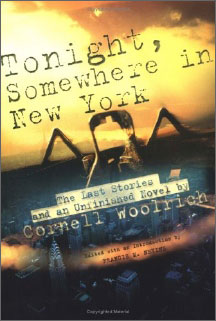 |
 Cornell Woolrich
Cornell Woolrich
Tonight, Somewhere in New York
Reviewed by: Mario Guslandi © 2006
Edited by Francis M. Nevins
Carroll & Graf
Hardcover
ISBN 0-7867-1530-8
409 pages, $26.00
Publication date: 2005
Date reviewed: January 7, 2006
Index:
Mystery
General Fiction
Often called — and rightly so — "the Hitchcock of the written word ", Cornell Woolrich is mainly remembered for classic mystery novels such as 'Rear Window' and 'The Bride wore Black' , both, incidentally, turned into famous movies. One of the founding fathers of noir literature, Woolrich was actually the author of hundreds of short stories published in the most popular detective magazines of the '30s and '40s, later collected in a number of books now sadly out of print.
The few collections of Woolrich's stories currently available are due to the expert and loving work of Francis M. Nevins, who has edited such invaluable volumes such as 'Nightwebs' and 'Night and Fear'.
In the present volume Nevins has assembled nine, previously uncollected stories from the late '50s and '60s when Woolrich's creative force was growing faint and he had started to revise and recycle some of his early, forgotten stories, selling them to magazine editors under different titles.
This disreputable habit of his doesn't detract from the quality of the stories themselves.
By no means minor pieces, the tales included in this new collection are up to the author's fame, entertaining and full of that suspense he's famous for.
Thus, 'Morning after morning' has a peculiar, dream-like atmosphere leading to the gradual discovery of what lies behind an atypical murder, while 'For the rest of her life' is a masterpiece of tension and dread, up to the final, nightmarish ending.
In 'The night of February 17, 1924' we can enjoy a great characterization in the portrait of a mafia boss and his ultimate downfall. Incidentally the story includes some dialogues in flawless Italian, an unusual accomplishment by an author of English mother tongue…
'Murder, obliquely' is based on the painstakingly subtle psychological reconstruction of the events leading to a murder, told through the words of an unhappy, clever young woman.
Two effective, cruel representations of the whims of a mocking destiny and of the frailty of human existence can be found in the excellent 'Too nice a day to die' and the bitter ' The number's up'.
A mysterious stalker, a fashion model and his fugitive lover are the main characters in 'Mannequin', a dark tragedy masterly drafted by Woolrich at his best.
The book also features fragments from an unfinished novel 'Tonight, Somewhere in New York' (aka 'The Loser'), where the protagonist-narrator describes how he killed the woman he once loved and then goes on remembering episodes from the past. The patchy nature of the available chapters makes it impossible to properly reconstruct the plot and its further developments, but the material has the peculiar charm of the unfinished work, making us wonder about the subsequent events.
As an extra bonus the book features two pieces from Woolrich's autobiographical manuscript 'Blues of a Lifetime': 'The Poor Girl', a delicate, personal love story narrated in a fictional style and 'Even God felt the Depression' the evocative description of the author's struggling for survival at the beginning of his writing career.
Nevins' superb introduction and his exhaustive critical notes are, as always, a further reason to greatly enjoy this volume, adding to the pleasure to rediscover once again the enormous narrative talent of an unsurpassed master of the noir such as Woolrich is and will always be.
Highly recommended.
|
 |
